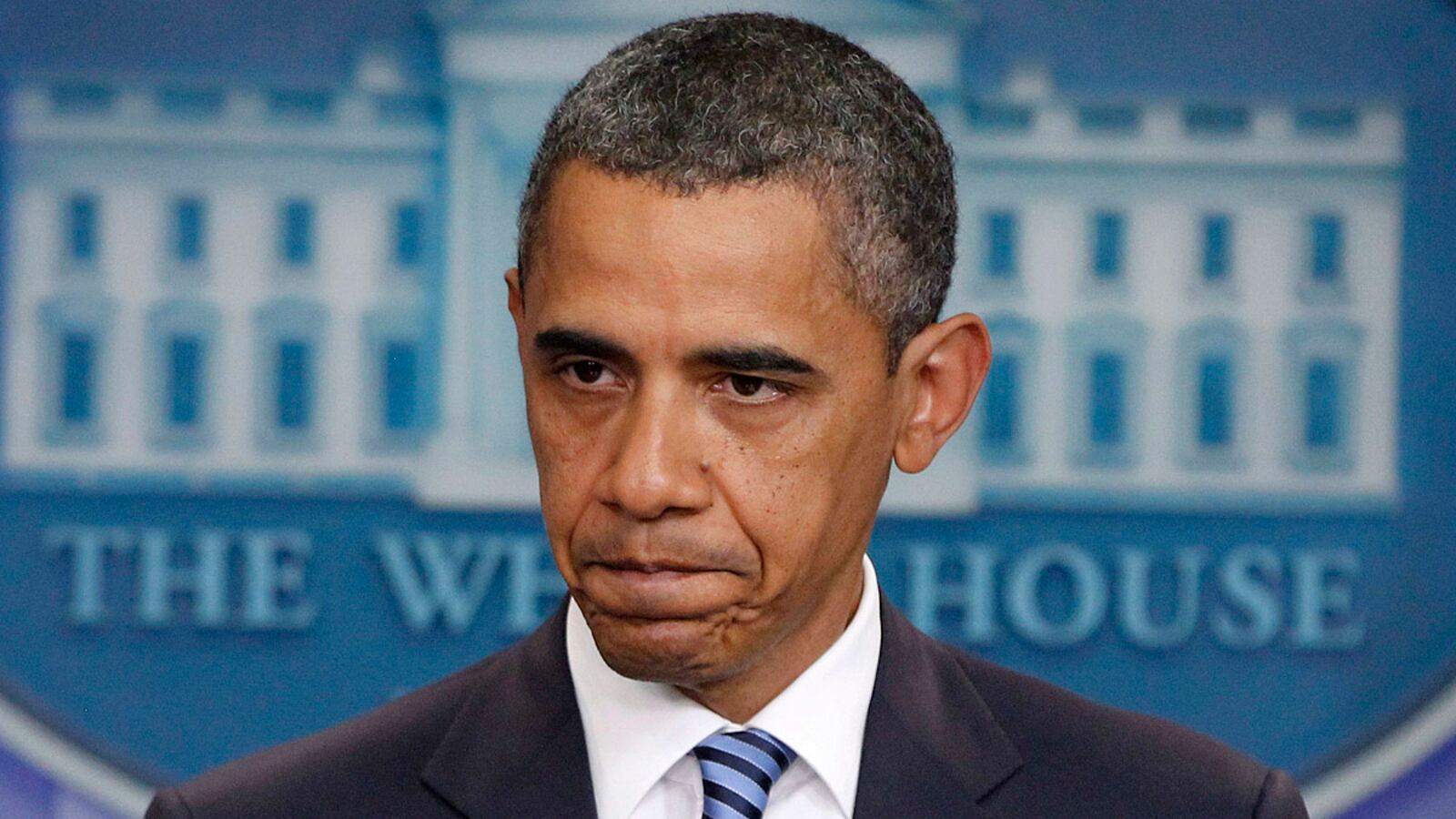Barack Obama doesn’t lack for detractors. The economy is struggling, unemployment is high, conservatives reject nearly every initiative he proposes, and the president’s base is growing increasingly annoyed by his seeming unwillingness to ever fight for liberal causes. But few of his detractors are likely to land a punch as solidly as Ron Suskind, whose new book, Confidence Men, focuses on the inner workings of Obama’s economic team as it worked through TARP, auto bailouts, financial reform, and health-care reform. The book paints a harsh, stark portrait of a president in over his head, struggling to manage a fractious team of disloyal, conniving advisers.
The book has already kicked up a storm in the nation’s capital, where White House officials are pushing back on some claims; former insiders have also disavowed some of their most damaging quotes. It may be tough to undermine the revelations, though. Suskind has a long track record—as a Pulitzer Prize–winning Wall Street Journal reporter and more recently with a series of damaging articles about the George W. Bush administration, most notably a book co-written with former Treasury secretary Paul O’Neill. So what’s causing the fuss? The Daily Beast speed-read the book, which is out today, to cull the biggest, juiciest revelations.
Choosing the B-Team
Suskind makes a compelling case that Obama was able to win the election because he was talking to the right people. That included everyone from Austan Goolsbee, a longtime friend and economist, to Robert Wolf, a top banker at UBS, to Paul Volcker, the former Fed chair. He knew the crash was coming, and when it came, he was able to talk about it competently—unlike John McCain. But when it came to choosing his administration, he went with a different group, anchored by Larry Summers and Tim Geithner. “Sure, the other team had brought to the table honesty and passion, but those bold visions of the campaign season had meanwhile resolved into the serious, often risk-averse business of actually governing … It no longer seemed like the right time to be making waves,” Suskind writes. From that early point flowed a series of bad decisions in both policy and politics. At the time, a frustrated Sen. Byron Dorgan, a Democrat, warned Obama: “You’ve picked the wrong people. I don’t understand how you could do this. You’ve picked the wrong people!”

The Woman Problem
Some of the most inflammatory passages from the book don’t deal with economics at all, but rather with the treatment of women in the administration. Part of the problem was the brusque Larry Summers, who’d made incendiary comments about women’s natural ability to do science years before. But the problem was wider: women in the administration felt they were ignored, with decisions made by men talking to one another. “The idea of a boys club being just Larry and Rahm [Emanuel, the then–White House chief of staff] isn’t really fair,” one insider told Suskind. “[Obama] was just as responsible himself.” Christina Romer, former head of the Council of Economic Advisers, said of one meeting where she’d been shut down by Summers, “I felt like a piece of meat.” Anita Dunn, who was communications director, said, “Looking back, this place would be in court for a hostile workplace … because it actually fit all of the classic requirements for a genuinely hostile workplace.” Obama moved to mollify them, although how well it worked is unclear; both Dunn and Romer have since left the administration. (It’s worth noting that the women have both claimed they were either misquoted or never made any remark along those lines.)
Obama vs. Krugman
No liberal critic has been as persistent in bashing the White House as economist and New York Times columnist Paul Krugman, who has complained that Obama’s stimulus was too small and that he has made numerous tactical and strategic errors in his handling of the economy. So it comes as something of a surprise that Obama was deeply influenced by Krugman early on, especially his argument about how to handle a banking crisis—comparing Japan’s piecemeal, failed approach with Sweden’s more aggressive and more successful one. The National Economic Council had been railroaded into taking Summers’s view, so Obama himself took up the other side. “Each morning at the economic briefing it was like we were debating Krugman,” one attendee said.
Geithner Betrays Obama
In many ways, Tim Geithner’s survival as Treasury secretary is improbable. Even as other economic advisers have left and the economy has continued to struggle, he has remained—even though there were rumors of his demise even in the first months after his confirmation. But it’s even more improbable when you learn that Geithner blatantly and unremorsefully disobeyed a direct instruction from Obama early on. With Citibank on the brink of collapse, the president announced that he wanted a plan formulated for “resolution”—essentially a government takeover—of it and other large banks. Geithner simply refused to do so. His intransigence became clear in early April, when Obama brought up the Citi plan and Romer blurted out, “I’m sorry, Mr. President, but there is no resolution plan for Citi.” Obama responded, “Well, there better be!” But by then, the idea was effectively dead.
‘There’s No Adult in Charge’
It took only months for the entire White House economic team to be at each other’s throat. There was Romer, feeling ignored and steamrolled by Summers. There were Geithner and Summers, old chums who fell out over the resolution plan for Citi, which Summers backed; one deputy told Romer, “Mommy and Daddy are fighting—can’t someone help us.” And there were Summers’s control-freak tendencies. On one occasion, Obama requested that Office of Management and Budget head Peter Orszag send him a memo, bypassing Summers, who was the normal conduit to the president. Summers was furious, screaming at Orszag, “What you’ve done is IMMORAL!” Emanuel, meanwhile, managed to feud with nearly everyone. And soon Obama became a target for the crossfire, too. When Emanuel forced Summers and Orszag to make up, Summers blasted Obama. “You know, Peter, we’re really home alone here … I mean it. We’re home alone. There’s no adult in charge. Clinton would never have made these mistakes.”
Obama Gets Rolled
A recurring theme is Obama’s utter failure of leadership. The president is incapable of making a decision; on the rare occasion when he does, he is ignored, as in the Citi case. During a meeting in March 2009, an annoyed Obama left the room to get dinner and said he wanted a decision when he returned. Emanuel promptly took over, saying, “Everyone shut the f--- up. Let me be clear—taking down the banking system in a program that could cost $700 billion is a fantasy.” Romer told Suskind that was the point where Emanuel violated his famous rule to never let a crisis go to waste—with Obama abdicating decision making, his chief of staff had decided on the status quo. “The bottom line is Tim and others at Treasury felt the president didn’t fully understand the complexities of the issue, or simply that they were right and he was wrong,” Alan Krueger (a former deputy Treasury secretary recently appointed to replace Romer as head of the CEA) tells Suskind. It’s a recurring pattern throughout the book: Obama voices a preference, his advisers overrule him, and he never says boo about it. Elsewhere, he allowed himself to be dictated to. Peter Orszag recalls Summers telling Obama, “I’ll make my argument first; you can go after me.” Orszag was incredulous that the president allowed a subordinate to talk to him that way, and shocked that he didn’t say, “I made that decision a week ago. Just do what I say.” As Volcker put it, “Obama is smart, but smart is not enough. Leadership is another thing entirely, about knowing your mind enough to make real decisions, ones that last.”
The Revolt Against Larry Summers
Eventually, much of the anger within the West Wing became focused on Summers. Typically brusque and always convinced on his own superior intelligence, he’d made himself the gatekeeper for all economic information going to the president, which effectively gave him control over all domestic policy. That infuriated other advisers with competing views, who found they simply couldn’t get to Obama. “Larry would frame an argument as A versus B, and that would sound right unless you were someone with deep enough mastery of an area to know that position D represented the real counterpoint and the best policy position was probably C,” said Krueger. Summers had become even more cantankerous after Obama reappointed Ben Bernanke as Federal Reserve chairman, depriving Summers of the job he thought he both deserved and had sewn up. It was mild-mannered Obama adviser Pete Rouse who finally gave Summers the hook, penning a memo to Obama that made the case for his removal.
Rahmbo Goes Too Far
Emanuel’s fiery temper is the stuff of legend, but the chief of staff finally met his match in Obama’s own fury. The White House was still reeling from the health-care fight, and the bill was set to limp across the finish line. The president had just read Rouse’s Summers memo. And now Emanuel, who’d frequently told reporters that he thought health care was the wrong fight at the wrong time, was the subject of an adoring column in The Washington Post that suggested that Obama had erred in not following Emanuel’s advice. Obama was livid, assuming Emanuel had been a source for the column, and “really laid him out,” a source told Suskind. “The president laced into him along the lines of ‘so tell me again how you’re right and I’m wrong.” It was the beginning of the end for Rahmbo, and Richard Daley’s decision to vacate the Chicago mayoralty was his saving grace—it gave Emanuel a chance to leave to run for mayor, rather than the inevitable sacking he was in line to receive.
Obama’s Detachment From Reality
The major takeaway from the book is about how quickly it became clear that Obama was out of his league running the administration. But Obama’s relation to reality, in addition to his managerial skills, comes into question. In August 2009, with health-care reform bogged down and his staff dissolving into frantic infighting—“the worst period of his presidency,” according to Dunn—Obama seemed to be blissfully detached from his political struggles. “My name is Barack Hussein Obama and I’m sitting here,” he said, “So yeah, I’m feeling pretty lucky.” It was only after Republican Scott Brown won the race for a Massachusetts Senate seat that Obama seemed to realize his inspiring life story wasn’t a governing strategy. “What is my narrative? I don’t have a narrative,” a lost-seeming Obama told senior staff. One staffer who was there told Suskind, “For someone like Obama, that’s like saying I don’t know who I am.” But Suskind actually ends on a more optimistic note—suggesting that with Summers and Emanuel gone and two years of experience under his belt, the president might finally be hitting his stride. If Suskind is right, the last few months—from his surrender in the deficit fight to anonymous internal sniping at new chief of staff Bill Daley—have disguised Obama’s newfound sure-footedness very well indeed.






